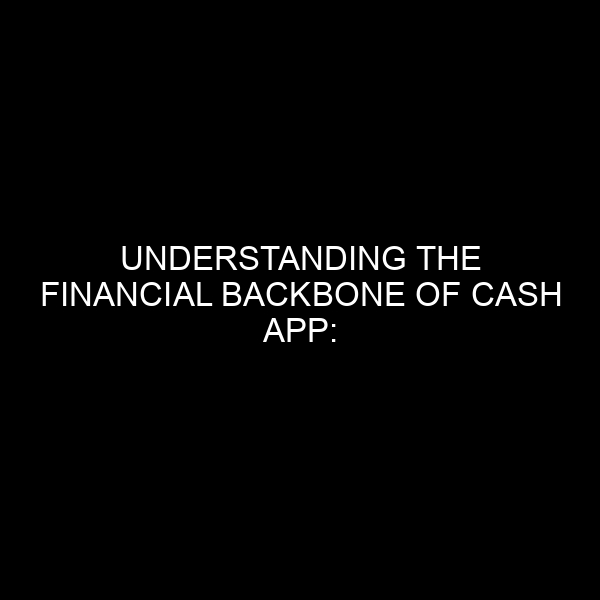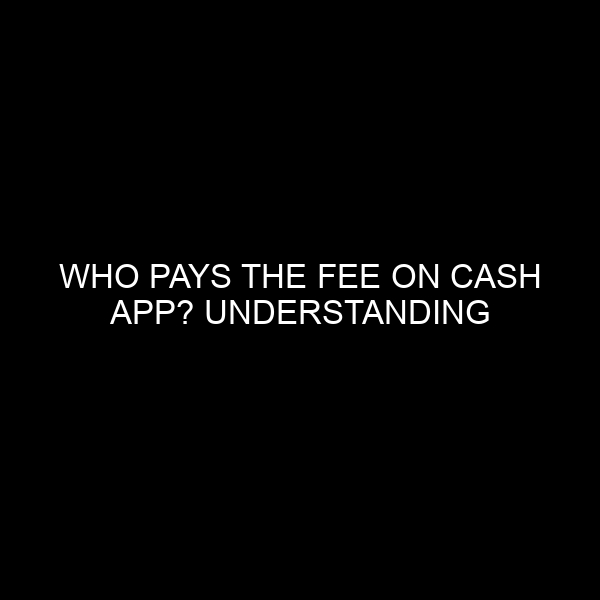Understanding the Financial Backbone of Cash App: Partner Banks and Beyond
As financial technology continues its rapid evolution, mobile applications like Cash App have found a significant foothold in our day-to-day transactions. Born out of the increasing demand for quick, user-friendly banking solutions, Cash App has enabled millions to send, receive, and store money with unparalleled ease. But what traditional banking entities stand behind this cutting-edge platform? Let’s delve deep into the financial foundations of Cash App and identify its supporting banking partners.
The Genesis of Cash App
Cash App, developed by Square Inc., launched in 2013 as a simple peer-to-peer payment service. It’s evolved rapidly, now offering a variety of financial services from direct deposit capabilities to stock trading. While its functionality may mirror some traditional banking attributes, it’s essential to remember that Cash App, by itself, is not a bank. Its operations require a network of established banking partnerships to ensure regulatory compliance, funds security, and seamless transaction processes.
Primary Banking Partners
As of my last update in 2021, the following are the known primary banking partners working closely with Cash App:
- Sutton Bank: Anytime you see a physical Cash Card – the debit card provided by Cash App – know that it’s issued by Sutton Bank. This Ohio-based bank handles not just the issuance but also several backend operations associated with the Cash Card.
- Lincoln Savings Bank (LSB): This is the institution behind Cash App’s direct deposit feature. When users set up direct deposit, their paychecks are routed through LSB, ensuring the safety and promptness of the transaction.
Why Banking Partnerships Matter
You might wonder why Cash App, a financial juggernaut in its own right, needs these traditional banking partners. Here’s why:
- Regulatory Compliance: Banking operations in the U.S. are subject to myriad regulations. Partnering with established banks ensures Cash App can offer services that align with the country’s legal and financial landscape.
- FDIC Insurance: Funds held within Cash App are not FDIC-insured directly through Square. However, by partnering with traditional banks, these funds are often held in pooled FDIC-insured accounts, providing an indirect layer of protection for users’ funds.
- Trustworthiness: Aligning with recognized banking entities enhances Cash App’s reputation. It assures users that their transactions and funds are handled by institutions with a long-standing history of reliability and security.
Emerging Banking Collaborations
The world of fintech is ever-evolving. With the pace at which Cash App introduces new features and services, it’s reasonable to expect more banking collaborations in the future. As they expand their services globally, there’s a likelihood of partnerships with international banks to cater to a diverse user base.
Benefits of a Digital-Traditional Banking Blend
Cash App’s collaboration with established banks offers a perfect blend of traditional banking’s reliability with digital finance’s convenience. Here are some compelling advantages:
- User-Friendly Interface: Cash App’s minimalistic design is intuitive, even for non-tech-savvy users.
- Instant Transactions: Real-time money transfers, especially during weekends or holidays, can be a real boon.
- Diverse Financial Services: From sending money to investing in stocks, Cash App offers an array of services under one roof.
- Security: Combining the security protocols of traditional banks with Cash App’s encryption measures results in a robust defense against potential financial breaches.
Conclusion
The partnership between Cash App and traditional banks like Sutton Bank and Lincoln Savings Bank showcases the synergy between established financial institutions and emerging fintech platforms. While Cash App provides the sleek interface and user experience, its banking partners ensure regulatory compliance and secure financial operations.
As we move further into the digital age, this cooperative approach between traditional and modern financial platforms is likely to become even more prevalent. Users stand to gain immensely from these collaborations, benefiting from the blend of convenience, speed, and trustworthiness that such partnerships inherently offer.






